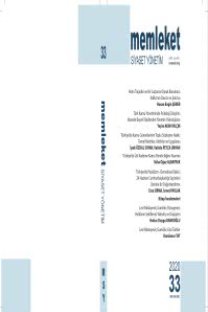KÜRESELLEŞME VE ULUS DEVLETİN GELECEĞİ
Fordizm, ekonomik kriz, refah devleti, ulus-devlet, küreselleşme
Fordizm, ekonomik kriz, refah devleti, ulus-devlet, küre- selleşme.,
___
- Aglietta, M., “Capitalism at the Turn of the Century: Regulation Theory and the Challenge of Social Change”, New Left Review, Nowember-December, No: 232, 1998, s. 41-90.
- Anderson, P., Tarihten Siyasete Eleştiri Yazıları, İletişim, İstanbul, 2003.
- Arrighi, G., “Global Capitalism and the Persistence of the North-South Divide”, Science and Soci- ety, Vol. 65, No. 4, Winter, 2002, s. 469-476.
- Axtman, R, Liberal Democracy into the Twenty-first Century: Globalization, Integration, and the Nation State, Manchaster University Press, Manchaster, 1996.
- Boratav, K., “Emperyalizm mi Küreselleşme mi?”, E.A. Tonak (der.), Küreselleşme, Emperyalizm, Yerelcilik, İşçi Sınıfı, İmge Yayınevi, Ankara, 2000.
- Burnham, P., “Küreselleşme, Apolitikleştirme ve ‘Modern’ Ekonomi Yönetimi”, Praksis, 9, Kış-Bahar 2003.
- Castells, M., The Power of Identity, Vol. II, Blackwell Publishers, Oxford, 1997.
- Castells, M., The Rise of the Network Society, Vol. I, Blackwell Publishers, Oxford, 2002.
- Castles, F. G., “The Future of the Welfare State: Crisis Myths and Crisis Realities”, 2003, http:// www.utoronto.ca/ethnicstudies/Castles_paper.pdf (5.7.2003).
- Haeusler, J., Hirsch, J., “Political Regulation: The Critics of Fordism and Transformation of the Party System in West Germany”, Gottdiener, M. and Komninos, N. (ed.), Capitalist Develop- ment and Crisis Theories, Mac Millon, London, 1989, s. 301-327.
- Held, D., Models of Democracy, Polity Press, Cambridge, 1997.
- Hirsch, J., “Fordism and Post-Fordism: The Present Social Crisis and its Consequences”, Bone- feld, W. ve Holloway, J.(ed.), Post-Fordism and Social Form, The Macmillan Press, London, 1991, s.8-34.
- Hosbawm, E. J., “The Future of the State”, C. H. Alcantra (ed.), Social Futures, Global Visions, Blackwell Publishers, Oxford, 1996.
- Jessop, B., “The Transition to Post-Fordism and the Schumpeterian Workfare State”, Burrows, R. ve Loader, B.(der.), Towards a Post-Fordist Welfare State içinde Routledge, London, 1994.
- Jessop, B., “Küreselleşme ve Ulus Devlet”, Türkiye Günlüğü, No. 64, Kış, 2001, s. 61-78.
- Jessop, B., The Future of Capitalist State, Polity Press, Cambridge, 2002.
- Jessop, B., State Power, Polity Press, Cambridge, 2007.
- Lipietz, A., “Uluslararası İşbölümünde Yeni Eğilimler: Birikim Rejimleri ve Düzenleme Tarzı”, Toplum ve Bilim, Bahar, no: 56-61, 1993, s.58-82.
- Mann, M., “Globalization is (Among Other Things) Transnational, International and American”, Science and Society, Vol. 65, No. 4, Winter 2002, s. 464-469.
- Mishra, R., Globalization and the Welfare State, Edward Elgar, Cheltenham ve Northampton, 1999.
- Munck, R., Emeğin Yeni Dünyası, Kitapyayınevi, İstanbul, 2002.
- Offe, C., “Competitive Party Democracy and the Keynesian Welfare State”, Offe, C., Contradicti- ons of the Welfare State, MIT Press, Cambridge ve Maassachusets, 1984, s.179-206.
- Pierson, C., “Continuity and Discontinuity in the Emergence of the ‘Post-Fordist’ Welfare State”, Burrows, R. ve Loader, B.(der.), Towards a Post-Fordist Welfare State, Routledge, London, 1994.
- Robinson, W., I. ve Harris, J., “Towards a Global Ruling Class? Globalization and the Transnational Capitalist Class”, Science and Society, Vol. 64, No. 1, Spring, 2000, s. 11-54.
- Robinson, W, I., “Global Capitalism and Nation-State -Centric Thinking- What We Don’t See When We Do See Nation States: Response to Critics”, Science and Society, Vol. 65, No. 4, Winter, 2002, s. 500-508.
- Smith, T., Technology and Capital in the Age of Lean Production, State University of New York Press, New York, 2000.
- Tonak, E.A., “Niçin Küreselleşme Üzerine Bir Kitap Daha?”, E.A. Tonak (der.), Küreselleşme, Emperyalizm, Yerelcilik, İşçi Sınıfı, İmge Yayınevi, Ankara, 2000.
- Went, R., “Globalization: Towards a Transnational State? A Skeptical Note”, Science and Society, Vol. 65, No. 4, Winter, 2002, s. 484-491.
- Wood, E.M., “Labor, Class, and State in Global Capitalism”, Wood, E.M., Meiksins, P. ve Yates, M. (eds.), Rising From the Ashes, Monthly Review Press, New York, 1998.
- Zizek, S., Kırılgan Temas, Metis Yayınları, İstanbul, 2002.
- ISSN: 1306-8202
- Yayın Aralığı: 2
- Başlangıç: 2006
- Yayıncı: Yerel Yönetim Araştırma Yardım ve Eğitim Derneği (YAYED)
“MÜSLÜMAN KALVİNİZMİ” DEDİKLERİ...
KÜRESELLEŞME VE ULUS DEVLETİN GELECEĞİ
SAĞLIKTA SOSYALLEŞTİRMENİN ÖYKÜSÜ
TÜRKİYE’DE DEVLET VE BURJUVAZİ Ulusötesi Mücadeleler ve Çözülen Devlet Sınıfı
Mehmet Gürsan ŞENALP, Örsan ŞENALP
TASFİYE EDİLEN DEVLETÇİLİK ve ÖRGÜTLENME: Piyasacı Devletçilikten Piyasaya
